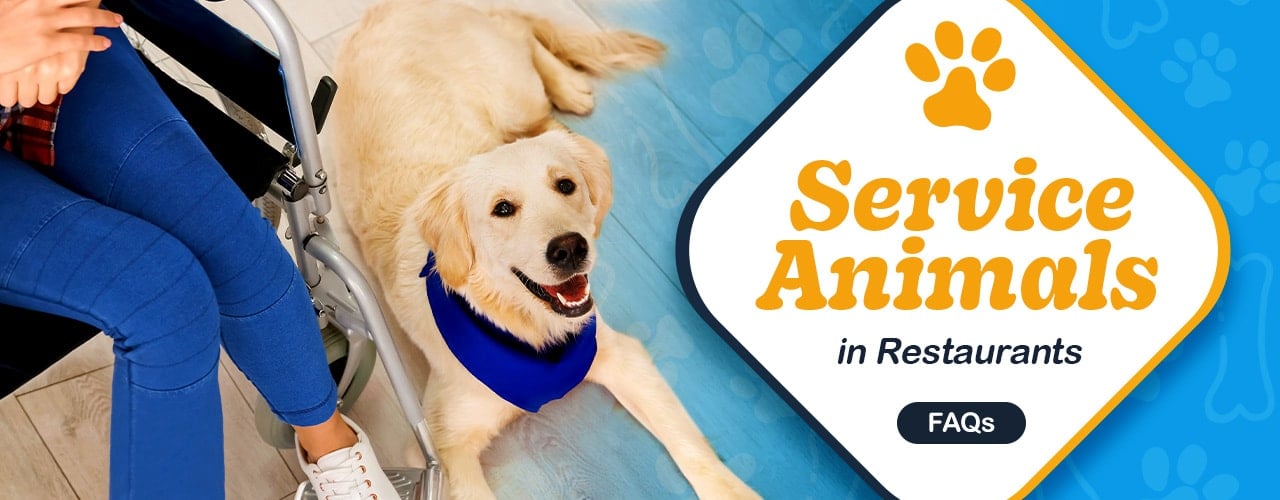Rules for Service Animals in Restaurants
Last updated on Jan 14, 2026Janine JonesMost customers don’t expect to see a dog in a dining room when they go out to eat but this may be a reality whether or not you operate a dog-friendly restaurant. As a restaurant owner, you may encounter service animals in your business and have questions about the rules and regulations surrounding the situation. So, what is a service dog? We’ve created a service dog FAQ to address some of the most common services animal questions and concerns.
What Is a Service Animal?
A service animal is an animal, usually a dog, that has been trained to assist a person with a disability by performing particular tasks. Service animals are protected by the ADA (Americans with Disabilities Act) and can accompany their owners wherever they go. Examples of service animals include guide dogs and signal dogs. These animals are working animals and not considered pets.
Responsibilities of a Service Animal

Service animals are trained to perform a variety of tasks that can aid someone with physical, sensory, intellectual, mental, or psychiatric disabilities. The following are just some of the responsibilities a service dog may be trained to do for its owner:
- Pulling wheelchairs
- Retrieving items (i.e. medicine, telephones, remotes, shoes, wallet)
- Navigating for visually impaired individuals
- Alerting hearing-impaired individuals of certain sounds or the presence of others
- Assisting their individual during a seizure
- Calming an individual with a psychiatric disability during episodes of destructive or impulsive behavior
- Sniffing out allergens for individuals with life-threatening food allergies
- Providing balance support for individuals with mobility disabilities
Each service animal is trained for the specific day-to-day needs of its handler. They do not need to be officially certified as a service animal to be considered one by the ADA as long as they are capable of performing the task a disabled person requires of them.
Types of Service Animals
According to the ADA, service animals are limited to dogs and miniature horses. Any other species of animals, including emotional support or therapy animals, are not recognized or protected by ADA laws. This means that a customer cannot bring just any type of animal into your restaurant.
How Can I Accommodate a Service Miniature Horse?
It may be alarming to encounter a miniature horse in your restaurant, but they are regularly used as service animals for their intelligence and strength. They can be trained to pull wheelchairs, retrieve items, guide visually impaired individuals, and provide stability assistance for those with mobility issues. Miniature horses are typically between 24”-34” in height and weigh around 70-100 lb., which puts them at a similar size as large dogs.
Because of their compact size, you should not need to do much to accommodate a service miniature horse in your establishment. As long as the service horse is housebroken, can be controlled by the owner, and can perform the task needed of them, the ADA requires that they be treated the same way as service dogs and allowed entry.
Where Is a Service Animal Allowed to Go?
A service dog accompanying a person with disabilities is allowed access to any part of a public facility and privately-owned business that is open to the public and paying customers. A customer with disabilities may bring their service animal to most hospitality industry businesses, such as hotels, restaurants, theaters, sporting arenas, banquet halls, and retail stores. This would also include the following areas of your restaurant:
- Dining rooms
- Waiting areas
- Restrooms and ADA bathroom stalls
- Outdoor dining spaces
Customers with disabilities cannot be barred from these common spaces. However, this does not mean that a service animal could roam freely in your restaurant. They cannot be in “employee only” locations, such as kitchens, pantries, and refrigeration units.
The only exception would be if you employ a person with disabilities that requires a service animal. In this circumstance, you’ll want to check with your local jurisdiction on ways to accommodate this employee and their service dog.
What If My Local Healthcare Law Prohibits Animals?

Service animals are excluded from healthcare laws that may prohibit animals in a business under the Americans with Disabilities Act. Since they are required to perform actions that a customer cannot do for themselves, they are allowed entry where a pet may not be. Be sure to check ADA laws and your local healthcare laws before posting animal restrictions in your storefront or restricting a customer from entering with their service animal.
Do I Still Have to Allow Service Animals in If I Have a “No Pets” Policy?
Yes, you would still be required to allow a service animal to enter your business even if you do not allow pets. Service animals are not pets and are considered working animals. They would be the exception to animal or pet restrictions.
Can a Restaurant Ask For Proof of Service Dog?
If a customer comes into your restaurant, can you ask for proof of a service dog? The answer is no. Neither you nor your staff can ask a disabled customer to show you their service animal’s certification. The ADA does not require an animal to be officially certified to be considered a service animal as long as they can perform the tasks a disabled person needs, are housebroken, and can be controlled. Under most circumstances, a disabled person is also not required to carry their certification papers with them, so the likelihood of them having it with them while they dine is minimal.
There are two questions you may ask a disabled customer about their service animal:
- Is the animal a service animal required because of a disability?
- What work or task has the animal been trained to perform?
The customer can only be turned away if the animal is just an emotional support animal, therapy dog, or pet. You may not ask the customer what their disability is or to see the task the animal has been trained for. Any further questions or entry restrictions can lead to ADA violations.
Do Service Dogs Have to Wear a Vest?
No, service dogs do not have to wear an identifying vest, collar, or backpack while they work to indicate that they are a service animal.
Do Service Dogs Have to Be On a Leash?
Service animals will typically be on a leash or in a harness but this is not required as it could interfere with the task they are trained to perform. If they are not wearing a leash, the owner must be able to maintain control of the animal through vocal commands, visual signals, or other training techniques.
Do I Have to Provide Food and Water for a Service Dog?
As a business owner, you are not responsible for the needs of a service dog. The owner should be able to provide food and water for their service animal. You are welcome to offer a dog bowl with fresh water if you so wish, but it is not required of you.
Can My Employees or Customers Pet a Service Dog?
Neither you nor your staff should pet or engage with a service animal when they are in your restaurant. This can be considered disrespectful to the handler and can distract the animal while it is working. The only exception is if the handler expresses that it is okay to do so. Train your host and serving staff how to interact with service animals, so customers with disabilities have a positive experience at your business.
What Can I Do If a Service Animal Bothers Another Customer?

A service animal should be under the control of its handler but in the event that a service dog barks, growls, or acts out and bothers another customer, you do have some options.
- Allow the handler to try and calm the animal to ensure that it wasn’t just an isolated incident.
- You may ask the parties involved if they would prefer a new table that offers the service animal more space.
- If the animal continues to act out, you may ask the disabled customer to remove the animal and offer to provide the service without the animal present.
- If a service animal is not housebroken, you may ask the customer to remove the service animal.
With this in mind, you cannot prevent a disabled person from returning with their service animal after an incident.
What If Another Guest Is Allergic to a Service Dog?
If a customer expresses concern with a service animal due to allergies or fear, you may offer that customer a new table farther away from the service animal. You may not relocate or isolate the customer with disabilities.
Can I Charge a Maintenance or Cleaning Fee for Service Animals?
As a business owner, you may not charge a maintenance surcharge or cleaning fee to a customer with disabilities for their service animal. The only time a fee may be considered is if your business usually charges a fee for damages and the service animal ends up damaging something while on your property. A service animal would also be excluded from a pet fee if you require that from your guests as they are not considered pets.
Are Emotional Support Animals Allowed in Restaurants?

Emotional support animals and therapy dogs are not recognized by the ADA as service animals and therefore are not required entry into restaurants and other public spaces with their handlers. Emotional support animals are usually intended for companionship and comfort, not for specific and necessary tasks which is why they are not considered essential in public spaces. Therapy dogs are typically brought to locations like hospitals and nursing homes to offer comfort to others and therefore do not need to accompany their owners wherever they go.
When Are Emotional Support Animals Allowed in Restaurants?
Emotional support animals and therapy dogs can enter any restaurant or business that advertises themselves as pet friendly. In any other circumstance, it is up to the business owner’s discretion if they’ll allow the animal on their property. If your restaurant is pet-friendly, be sure to advertise it on Yelp, BringFido, and your restaurant’s website.
Service Animal Laws by State
While most states strictly follow the ADA’s definition and requirements for service animals, you may find some variation to the wording from state to state. Be sure to check with legal counsel in your local jurisdiction to prevent any ADA violations and lawsuits.
Use this guide to teach your restaurant and staff how to properly interact with a service animal the next time one is brought to your business. By becoming familiar with the answers to these questions, you’ll be able to provide your disabled patrons with a positive experience that can lead to customer loyalty and glowing reviews.



